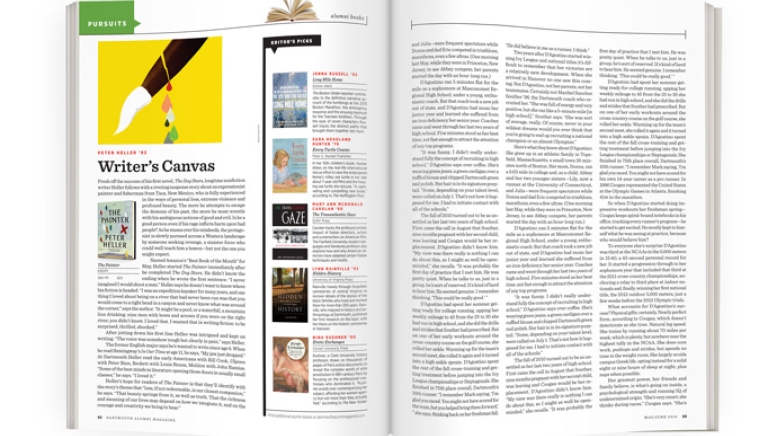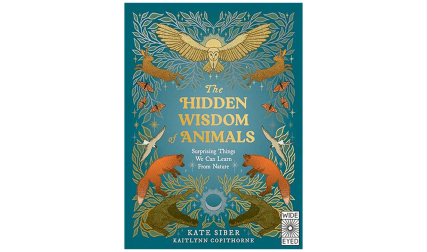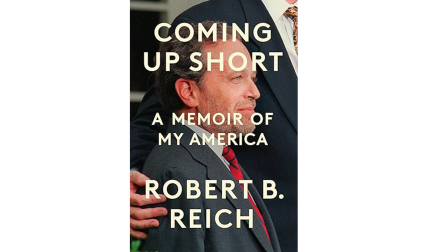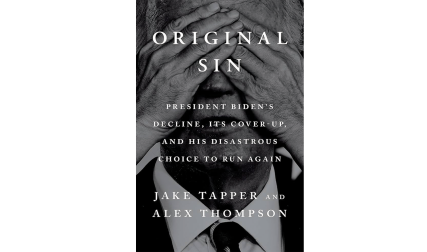Peter Heller ’82
The Painter
Knopf
Fresh off the success of his first novel, The Dog Stars, longtime nonfiction writer Heller follows with a riveting suspense story about an expressionist painter and fisherman from Taos, New Mexico, who is fully experienced in the ways of personal loss, extreme violence and profound beauty. The more he attempts to escape the demons of his past, the more he must wrestle with his ambiguous notions of good and evil. Is he a good person even if his rage inflicts harm upon bad people? As he muses over his misdeeds, the protagonist is slowly pursued across a Western landscape by someone seeking revenge, a sinister force who could well teach him a lesson—but not the one you might expect.
Named Amazon’s “Best Book of the Month” for May, Heller started The Painter immediately after he completed The Dog Stars. He didn’t know the ending when he wrote the first sentence: “I never imagined I would shoot a man.” Heller says he doesn’t want to know where his fiction is headed. “I was an expedition kayaker for many years, and one thing I loved about being on a river that had never been run was that you would come to a tight bend in a canyon and never know what was around the corner,” says the author. “It might be a pool, or a waterfall, a mountain lion drinking; nine men with bows and arrows if you were on the right river; you didn’t know. I loved that. I wanted that in writing fiction: to be surprised, thrilled, shocked.”
After jotting down his first line Heller was intrigued and kept on writing. “The voice was somehow tough but clearly in pain,” says Heller.
The former English major says he’s wanted to write since age 6. When he read Hemingway’s In Our Time at age 11, he says, “My jaw just dropped.” At Dartmouth Heller read the early Americans with Bill Cook, Ulysses with Peter Bien, Beckett with Louis Renza, Molière with John Rassias. “Some of the best minds in literature opening those doors in usually small classes,” he says. “I loved it.”
Heller’s hope for readers of The Painter is that they’ll identify with the story’s theme that “loss, if not redeemable, is our closest companion,” he says. “That beauty springs from it, as well as truth. That the richness and meaning of our lives may depend on how we integrate it, and on the courage and creativity we bring to bear.”
Jenna Russell ’92
Long Mile Home
Dutton Adult
The Boston Globe reporter contributes to the definitive narrative account of the bombings at the 2013 Boston Marathon, the emergency response and the ensuing manhunt for the Tsarnaev brothers. Through the eyes of seven characters Russell traces the distinct paths that brought them together last April.
Sara Hoagland Hunter ’76
Every Turtle Counts
Peter E. Randall Publisher
In her 10th children’s book, Hunter draws on the real-life international rescue effort to save the endangered Kemp’s ridley sea turtle in her tale about 7-year-old Mimi and the freezing sea turtle she rescues. “A captivating and compelling new book,” according to The Huffington Post.
Mary Ann McDonald Carolan ’80
The Transatlantic Gaze
SUNY Press
Carolan tracks the profound artistic impact of Italian directors, actors and screenwriters on American film. The Fairfield University modern languages and literatures professor also explores how and why American directors have adapted certain Italian techniques and motifs.
Lynn Rainville ’93
Hidden History
University of Virginia Press
Rainville travels through forgotten cemeteries of central Virginia to recover details of the stories of the black families who lived and worked there for more than 200 years. Rainville, who majored in history and anthropology at Dartmouth, published her first research on the topic with her thesis on the historic cemeteries in Hanover.
Nina Kushner ’90
Erotic Exchanges
Cornell University Press
Kushner, a Clark University history professor, draws on thousands of pages of Paris police documents to reveal the complex world of elite prostitution in 18th-century Paris by focusing on the professional mistresses who dominated it. “Kushner avoids over-contemporizing her subject, affording her women agency but not more than they actually had,” according to The New Yorker.
Additional books that were not listed in our print version:
Pulitzer Prize-winning playwright and novelist Frank D. Gilroy ’50 has released a new Kindle single recounting the story of a young Chicago reporter’s suspenseful and hilarious entanglements with the Dillinger gang in Trigger Happy (Amazon).
H. Nicholas Muller III ’60, a former president of Colby-Sawyer College and dean and professor of history at the University of Vermont, offers a dynamic look at the best of Vermont through images and essays from 19 contributors as co-editor of The Vermont Difference: Perspectives from the Green Mountain State (Woodstock Foundation and Vermont Historical Society). He also explores the persona of the most famous figure in Vermont’s past as coauthor of Inventing Ethan Allen (University Press of New England).
David J. Langum ’62 takes a look at early California’s socio-legal history through the lens of an eccentric working class woman’s biography in Quite Contrary: The Litigious Life of Mary Bennett Love (Texas Tech University Press).
John White ’61, a writer and lecturer in the fields of consciousness research, reflects on his role in uncovering the truth about the events leading to the Vietnam War with his memoir, The Gulf of Tonkin Events: Fifty Years Later (CreateSpace).
Lance Dodes ’66, M.D., a recently retired assistant clinical professor of psychiatry at Harvard Medical School, analyzes flawed addiction recovery programs and advocates for more evidence-based treatment options in The Sober Truth: Debunking the Bad Science Behind 12-Step Programs and the Rehab Industry (Beacon Press).
R.H. King Jr. ’75 describes a fictional Dartmouth professor’s journey through a criminal trial and insanity defense as he struggles to understand why he killed 15 of his students in his first novel, novel Why? A Courtroom Drama of Self-discovery (Walden Road Publishing).
Former U.S. Treasury Secretary Timothy Geithner ’83 explains how he helped the United States navigate the worst financial crisis since the Great Depression—from boom to bust to rescue to recovery—in his memoir, Stress Test: Reflections on Financial Crises (Crown).
Michelle Duster ’85, who has written two books on journalist and civil rights activist Ida B. Wells, follows fourth-grader Tate as he finds himself interacting with historic figures in her first children’s book, Tate and His Historic Dream (Highlights of Chicago Press).
Scott Straus ’92, professor of political science and international studies at the University of Wisconsin–Madison, explores critiques of the conventional human rights discourse as coeditor of a collection of essays, The Human Rights Paradox: Universality and Its Discontents (University of Wisconsin).




